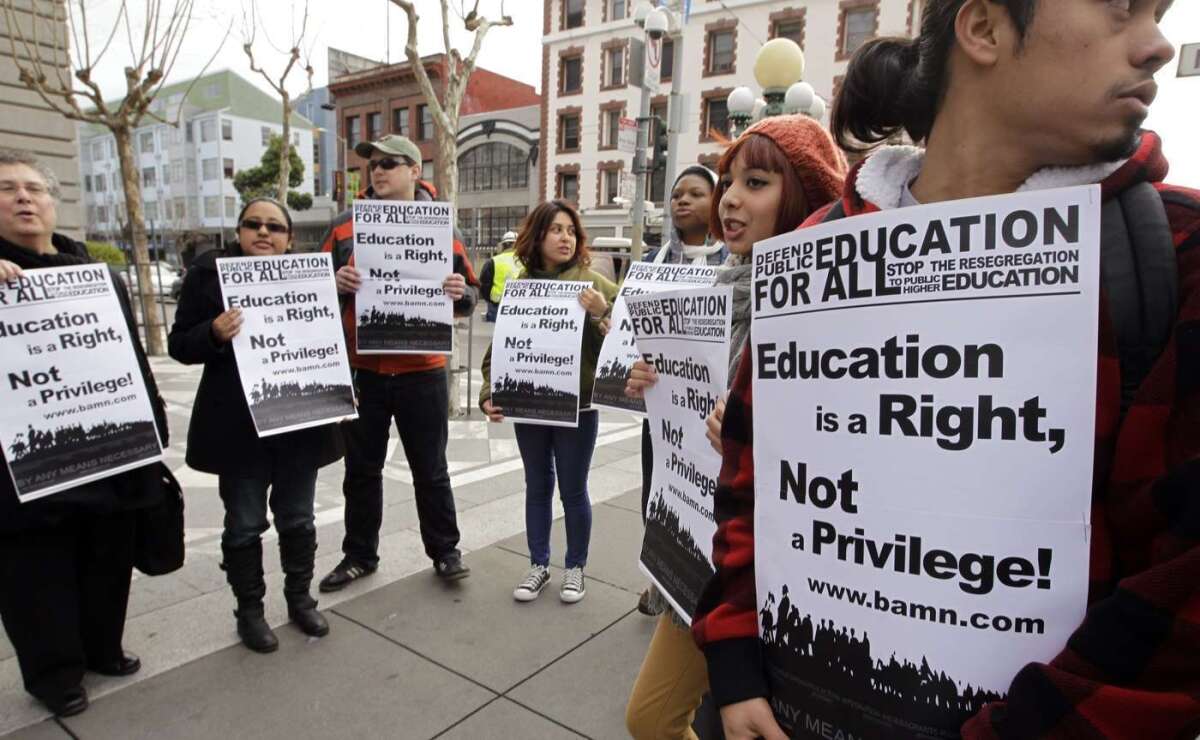Editorial: Of course race matters. Put affirmative action back on California’s ballot

Twenty-four years ago California voters made a mistake whose consequences continue to ripple through the state. They passed Proposition 209, a citizen initiative that barred state and local agencies from considering race, ethnicity or gender in hiring and public university admission. In so doing, voters bought into a false premise sold by misguided proponents: that giving women and people of color a small boost in a wildly unfair system was a worse kind of discrimination.
Nearly a quarter of century later, women and people of color are still at a sharp disadvantage by almost every measure. Women still make less than men for the same work, and women of color less than white women. Women and nonwhite people are still woefully underrepresented in the board rooms and in the halls of power. The economic picture for Black Californians is still exceptionally bleak; they are underrepresented in the University of California but overrepresented in the state’s prisons and among the homeless. Pretending we lived in a colorblind meritocracy for the past 24 years clearly didn’t make it so.
Now the state’s leaders have a chance to allow Californians to revisit Proposition 209. They should. California and the nation have been forced by the civil unrest ignited by the killing of George Floyd to start a long-overdue examination of the deeply embedded racism in public institutions, and there’s new momentum for proposals that would make those institutions fairer and more just for all Americans.
One of those proposals is Assembly Constitutional Amendment 5 by Assemblywoman Shirley Weber (D-San Diego), which would place a repeal of Proposition 209 on the November ballot. The California Assembly gave its blessing to it on Wednesday. Now it’s the California Senate’s turn to make the same correct choice, and with haste; the deadline for placing items on the November ballot is less than two weeks away. Just putting the measure before the voters is an important step as it will spark a deeper discussion about a hurtful episode in the state’s history and its lingering effects a quarter century later.
It will be a different conversation this time around, to be sure. For one thing, we now have data that show how certain ethnic groups and women were hurt by Proposition 209. Enrollment of Black, Latino and Native American students dropped at the University of California campuses after Proposition 209 and hasn’t yet recovered for Black or Native American students. During that time Latinos overtook whites as the largest ethnic group, and while they increased enrollment they still make up only a quarter of the University of California student body. State and local governments were forced to cancel programs that gave preferential treatment in the awarding of contracts for minority- (a now-outdated term) and women-owned businesses, costing those firms nearly $1 billion a year, by one estimate, and put on hold other efforts to promote racial and gender diversity in hiring.
We know that it will be a difficult conversation for Asian Americans, some of whom oppose putting the repeal of Proposition 209 up for a vote. They fear that a return of affirmative action policies will come at their expense in university admissions. We believe they’re wrong, but we are eager for that and other aspects of the proposed repeal to be examined and critiqued.
It’s unfortunate if this important debate pits ethnic communities against each other. Affirmative action is an equalizer that benefits everyone, including members of the Asian American and Pacific Islander community who collectively lost ground in UC admissions in the decade after Proposition 209 passed. It wouldn’t abolish the 14 factors that admissions officials use to judge student applicants, which include academic performance; instead, it would merely allow them to add another factor, race, into the mix for a truer, more holistic picture. Having to ignore race has also put the UCs at a disadvantage with elite schools that are able to use race as a factor when considering applications.
We wish race didn’t matter in hiring and college admissions. We wish that everyone had an equal opportunity to access quality education and achieve economic prosperity. But they didn’t in 1996 and still don’t in 2020. Race and gender are still automatic disadvantages that are difficult to overcome. Helping to shrink the opportunity gap with a tiny leg up doesn’t give them an unfair advantage over those born already ahead, just a slightly better chance than they have now. That’s not discrimination. That’s justice. And it’s time Californians had another debate about how to achieve it.
More to Read
A cure for the common opinion
Get thought-provoking perspectives with our weekly newsletter.
You may occasionally receive promotional content from the Los Angeles Times.










